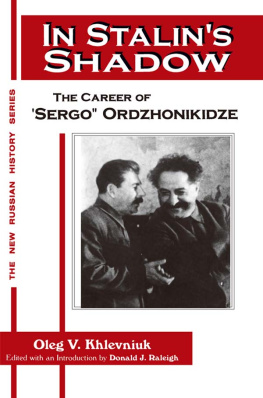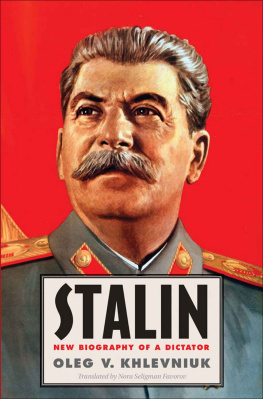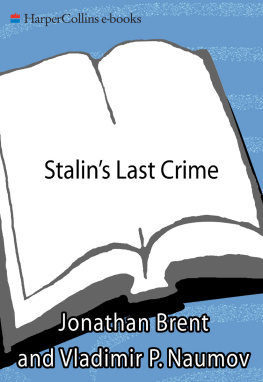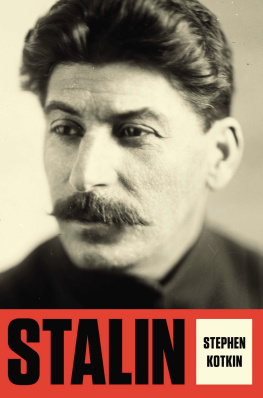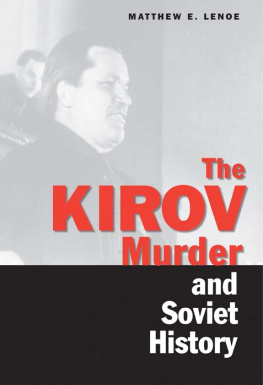IN STALINS SHADOW
The New Russian History
Series Editor: Donald J. Raleigh,
University of North Carolina, Chapel Hill
This new series makes examples of the finest work of the most eminent historians in Russia today available to English-language readers. Each volume has been specially prepared by the author with an international audience in mind, and each will be translated and introduced by an outstanding Western scholar in the same field.
THE REFORMS OF PETER THE GREAT
Progress Through Coercion in Russia
Evgenii V. Anisimov
Translated with an introduction by John T. Alexander
IN STALINS SHADOW
The Career of Sergo Ordzhonikidze
Oleg V. Khlevniuk
Translated by David Nordlander
Edited with an introduction by Donald J. Raleigh,
with the assistance of Kathy S. Transchel
First published 1995 by M.E. Sharpe
Published 2015 by Routledge
2 Park Square, Milton Park, Abingdon, Oxon OX14 4RN
711 Third Avenue, New York, NY 10017, USA
Routledge is an imprint of the Taylor & Francis Group, an informa business
Copyright 1995 Taylor & Francis. All rights reserved.
No part of this book may be reprinted or reproduced or utilised in any form or by any electronic, mechanical, or other means, now known or hereafter invented, including photocopying and recording, or in any information storage or retrieval system, without permission in writing from the publishers.
Notices
No responsibility is assumed by the publisher for any injury and/or damage to persons or property as a matter of products liability, negligence or otherwise, or from any use of operation of any methods, products, instructions or ideas contained in the material herein.
Practitioners and researchers must always rely on their own experience and knowledge in evaluating and using any information, methods, compounds, or experiments described herein. In using such information or methods they should be mindful of their own safety and the safety of others, including parties for whom they have a professional responsibility.
Product or corporate names may be trademarks or registered trademarks, and are used only for identification and explanation without intent to infringe.
First published in Russian in 1993 by Rossiia molodaia under the title
Stalin i Ordzhonikidze: Konflikty v Politbiuro v 30-e gody. 1993 by O. V. Khlevniuk.
Library of Congress Cataloging-in-Publication Data
Khlevniuk, O. V. (Oleg Vitalevich)
[Stalin i Ordzhonikidze. English]
In Stalins shadow : the career of Sergo Ordzhonikidze / by Oleg V. Khlevniuk : edited by Donald J. Raleigh : with the assistance of Kathy S. Transchel : translated by David J. Nordlander,
p. cm. (The new Russian history)
Includes bibliographical references and index.
ISBN 1-56324-562-0. ISBN 1-56324-563-9 (pbk.)
1. Soviet UnionHistory19251953. 2. Stalin, Joseph, 18791953.
3. Ordzhonikidze, Sergo, 18861937. I. Raleigh, Donald J.
II. Transchel, Kathy S. III. Title. IV. Series.
DK267.K437813 1995
947.084dc20 955694
CIP
ISBN 13: 9781563245633 (pbk)
ISBN 13: 9781563245626 (hbk)
Until recently, historical studies on the dark years of Iosif Vissari-onovich Stalin were hindered by the Kremlins cloak of secretiveness. The inaccessibility of essential documents compelled investigators to snatch at whatever bits of information became available, including rumors and various other suspect sources, in constructing their narratives. The lack of hard data, however, did not prevent some historians from pleading their cases with passion and conviction. Not surprisingly, the intrusion of the authors personal biases into their works has been characteristic of much of the writing on the Stalin period.
The opening in the post-Soviet era of somebut not allof the archives needed for a full-scale reassessment of the Stalin years has led to a historiographical revolution of sorts, as has the fact that Russian historians have been freed from the constraints of Soviet dogma and rhetoric. Excited by the prospect of reinterpreting a pivotal era in their countrys history, they have begun to contribute fresh analyses of the 1930s and 1940s. But despite serendipitous discoveries, it appears that the archives might not hold answers to all the burning questions. The imperfect record on some critical issues can nonetheless be put to good use by careful historians extending the parameters of debate, raising new questions, and throwing light on the most obscure chapters of Soviet history. A case in point is Oleg Khlevniuks absorbing study of Grigorii K. (Sergo) Ordzhonikidze, In Stalins Shadow.
Ordzhonikidze? Although not well known in this country outside academic circles, the name Ordzhonikidze is more than familiar to Russian readers, thanks to a minor personality cult Soviet officialdom constructed around him. Schools and institutes, streets and highways, towns and farms carried and still carry his name. His ashes remain buried in the Kremlin walls, among the pantheon of fallen revolutionary heroes. Despite the efforts of Soviet historiography to present an official interpretation of his career, however, Ordzhonikidze has been the subject of sustained speculation and hearsay ever since his death in rather mysterious circumstances in 1937, a year in which so many other Old Bolsheviks perished at the hands of the secret police.
As one of Stalins closest associates and most powerful and influential economic managers, Ordzhonikidze, a fellow Georgian, played no small role in Kremlin politics during the years leading up to his death. While keeping Ordzhonikidze as his focal point, Khlevniuk examines the career of Sergo to probe larger questions of Soviet political history. Was Stalin powerful enough to have the Politburo do his bidding, or did top party leaders play a significant role in decision making? Was there opposition to the party line within the organizations general membership or the inner sanctums of the Kremlin and, if so, did it ever emerge as a viable alternative to Stalinism? Were there conflicts between Stalin and his closest comrades? If so, how far did they go to oppose him?
Drawing on newly opened files in both the former Communist Party and Soviet government archives, the author builds on the two extant points of view found in the scholarly literature about Ordzhonikidzes role in Kremlin intrigues. Some authors, basing their arguments on memoirs and personal accounts, argue that Ordzhonikidze prepared to challenge Stalin openly and consequently paid with his life. A counter viewpoint is that no one among his contemporaries considered Ordzhonikidze a serious opponent of Stalins policies, especially that of state terror, and that Sergo took his own life. Weighing both perspectives, Khlevniuk offers an alternative explanation that is more subtle and nuanced. And more convincing.
Khlevniuks Ordzhonikidze is a tragic figure. A soft Stalinist deeply troubled by unfounded accusations of industrial sabotage and no longer able to comprehend and accommodate that which was going on around him, Sergo became defensive and confused. The ensuing crisis consumed himand resulted in his murder. Or was it suicide? Khlevniuk interrogates the available sources and offers an answer to this recurrent question. What is so attractive about his compelling argument is that it helps explain how the Stalinist system worked.
Khlevniuks study can be recommended to readers for several other reasons. His is not only the first published study of the Politburo in the 1930s based on recently declassified materials, but it is also one of the few works available that delves into the vital interlude between Sergei Kirovs murder in 1934, often viewed as the opening salvo of the Stalinist terror, and Ordzhonikidzes demise in 1937. Deftly weaving a tale of suspense and intrigue, Khlevniuk frequently lets the documents speak for themselves. Whenever the sources are silent or difficult to decode, he offers plausible versions of what might have been. Unlike many of his contemporaries who in the current scholarly atmosphere in Russia highlight the moral turpitude and historical guilt of Soviet leaders, Khlevniuk adopts a detached tone in passing judgment on his protagonists.

